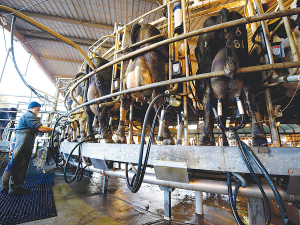Open Country opens butter plant
When American retail giant Cosco came to audit Open Country Dairy’s new butter plant at the Waharoa site and give the green light to supply their American stores, they allowed themselves a week for the exercise.
 Several New Zealand farmers and investors stand to lose millions of dollars following the collapse of one of Chile’s largest dairy businesses.
Several New Zealand farmers and investors stand to lose millions of dollars following the collapse of one of Chile’s largest dairy businesses.
A group of New Zealand farmers and investors stand to lose millions of dollars following the collapse of one of Chile's largest dairy businesses.
Around 18 New Zealand dairy and kiwifruit farmers and investor - from both here and in Chile - poured over US$50m into Chilterra since its formation in 2006. Late last year the company went into "judicial reorgnaisation" owing US$60m to a consortium of banks.
Chilterra owns 7,200ha of farmland, has nine milking parlours and more than 13,000 cattle. The farms are within 100km radius of Osorno, Southern Chile, an area known for its dairy farming and similarities to New Zealand soils and climate.
Sources have told Rural News that the firm collapsed due to a combination of factors - low milk price, poor farm management practices and soaring input costs. There was also a breakdown in the relationship between majority Chilean investor Ricardo Rios and the NZ investors.
While Chilterra did well in its early years, differences emerged between NZ and Chilean business partners as more money was needed to keep the company going.
"It was very poorly run, NZ investors were kept in the dark, the company borrowed to the hilt and NZ farmers and investors had little or no say at all in the running of the company," sources say.
NZ farmers, who invested in Chilterra, are refusing to comment in fear of reprisal. The company's board was chaired by Waikato ag consultant Mike McBeath and included several New Zealand farmers as directors.
Questions from Rural News to McBeath were unanswered.
However, an email to NZ shareholders in June last year, after the company's 2021 annual general meeting, confirmed "negative working capital and negative results for the year".
The emails shows NZ investors were unhappy "with the collective performance of the board and Chilterra".
"They are deeply concerned about the financial position of the business based on the financial statements. There has never been a review of any performance despite significant differences in actual performance against budgeted performance."
The NZ investors also requested the directors to submit a vote of no confidence in the Chilterra board.
The email states that Chilterra's financials "continue to show the same trends as in the past with significant growth in liabilities".
"Granted this has been offset by significant value increases, so the technical equity reported remains static."
The NZ farmers expect Chilean banks to take a haircut and sell the farms to recoup whatever they can - leaving nothing for investors.
Success Story!
Not all New Zealand dairy investments in China have run into trouble.
Manuka SA in Chile is 80% Kiwi-owned and today has 59 dairy farms and 70,000 cattle - including 48,000 milking cows - in the South American country. Manuka produces 10% of Chile's milk.
Manuka founder Mark Townshend told Rural News that the company is achieving what it set out to do and produce NZ levels of production per hectare - 1,100-1,300 kgMS/ha - and at NZ equivalent cost of production on lower cost land assets.
"It has been a growth story starting with one man, Conall Buchannan, and one farm in 2005 and growing through a Chilean workforce of 600 people across the business today," Townshend told Rural News. "The keys to success have been 'kiwi control' and employing good Chilean executives."
Townshend says the recent sale of the Soprole business in Chile by Fonterra has provided clarity.
The milk price in Chile today is at around NZ$9.30/kgMS. Cash flows have been tight with higher interest rates, but the inflation rate is now back at 5%.
Townshend says, like in NZ, success in large scale farming in Chile is all about low-cost milk production, excellence in management and good stakeholder support and engagement.
Legal controls on the movement of fruits and vegetables are now in place in Auckland’s Mt Roskill suburb, says Biosecurity New Zealand Commissioner North Mike Inglis.
Arable growers worried that some weeds in their crops may have developed herbicide resistance can now get the suspected plants tested for free.
Fruit growers and exporters are worried following the discovery of a male Queensland fruit fly in Auckland this week.
Dairy prices have jumped in the overnight Global Dairy Trade (GDT) auction, breaking a five-month negative streak.
Alliance Group chief executive Willie Wiese is leaving the company after three years in the role.
A booklet produced in 2025 by the Rotoiti 15 trust, Department of Conservation and Scion – now part of the Bioeconomy Science Institute – aims to help people identify insect pests and diseases.